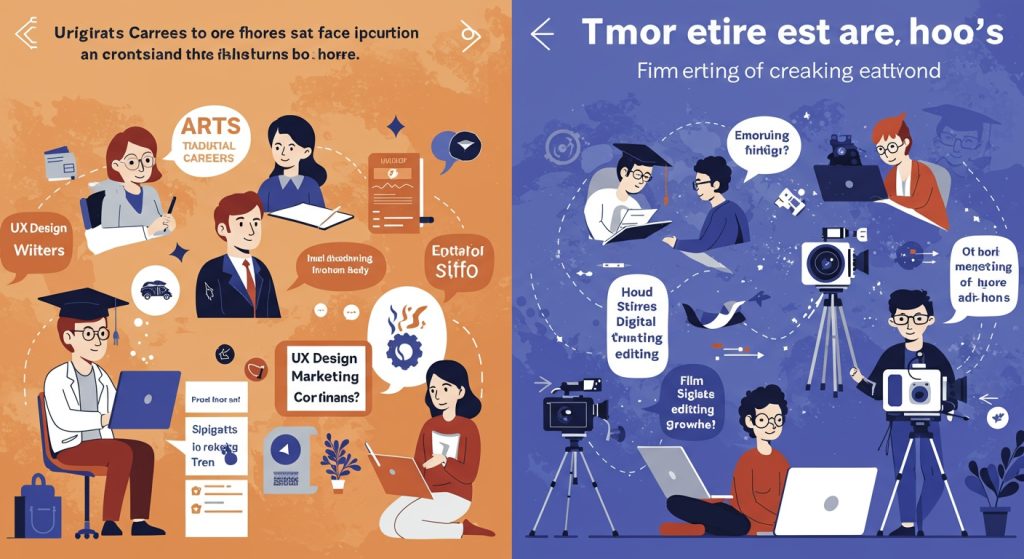A Computer Science degree opens doors. Which doors lead to the fastest-growing, most rewarding careers? We’ll explore the evolving landscape of tech jobs, focusing on opportunities emerging within the next five years. Demand for specialized skills is surging; for example, AI/ML engineers are projected to grow exponentially as businesses integrate predictive analytics and automation. Cybersecurity professionals are critically needed to combat increasingly sophisticated threats, driving demand for roles in threat intelligence and incident response. By understanding these trends and the core competencies they require, you can strategically align your skills and capitalize on the most promising career paths in this dynamic field.

The Ever-Evolving Landscape of Computer Science Careers
A Bachelor of Science in Computer Science (BSc Computer Science) is a highly versatile degree, opening doors to a wide range of career paths. But, the technology industry is constantly evolving, meaning the most in-demand jobs of today might not be the same in five years. Understanding these trends is crucial for students and recent graduates looking to build successful and fulfilling careers.
Artificial Intelligence and Machine Learning Specialists
Artificial Intelligence (AI) and Machine Learning (ML) are no longer futuristic concepts; they are integral parts of our everyday lives. From personalized recommendations on streaming services to self-driving cars, AI and ML are transforming industries at an unprecedented pace. This translates into significant demand for skilled professionals.
- Definition: AI refers to the ability of machines to perform tasks that typically require human intelligence. ML is a subset of AI that allows systems to learn from data without explicit programming.
- Key Technologies: Python, TensorFlow, PyTorch, scikit-learn, natural language processing (NLP), computer vision.
- Real-World Applications: Healthcare diagnostics, fraud detection in finance, personalized marketing, autonomous vehicles, virtual assistants.
Job Titles: Machine Learning Engineer, AI Researcher, Data Scientist, AI Architect, NLP Engineer.
Career Growth: Exceptional. The demand for AI and ML specialists is projected to grow exponentially in the coming years. Salaries are typically very high, reflecting the specialized skills required.
Cybersecurity Experts
As our reliance on technology increases, so does the threat of cyberattacks. Businesses and individuals alike are vulnerable to data breaches, ransomware attacks. Other forms of cybercrime. This has created a critical need for cybersecurity experts who can protect systems and data.
- Definition: Cybersecurity is the practice of protecting computer systems and networks from theft, damage, or unauthorized access.
- Key Technologies: Network security, cryptography, ethical hacking, intrusion detection systems, security details and event management (SIEM).
- Real-World Applications: Protecting financial institutions from fraud, securing government infrastructure, safeguarding personal data, incident response.
Job Titles: Cybersecurity Analyst, Security Engineer, Penetration Tester, Security Architect, Chief data Security Officer (CISO).
Career Growth: Excellent. The cybersecurity field is experiencing a significant skills gap, meaning there are more jobs available than qualified candidates. This trend is expected to continue for the foreseeable future.
Data Scientists and Big Data Engineers
The amount of data generated every day is staggering. This “big data” holds valuable insights that can be used to improve business operations, make better decisions. Develop new products and services. Data Scientists and Big Data Engineers are responsible for collecting, analyzing. Interpreting this data.
- Definition: Data Science is an interdisciplinary field that uses scientific methods, processes, algorithms. Systems to extract knowledge and insights from structured and unstructured data. Big Data Engineering focuses on building and maintaining the infrastructure needed to store and process large datasets.
- Key Technologies: Hadoop, Spark, SQL, NoSQL databases (e. G. , MongoDB, Cassandra), data visualization tools (e. G. , Tableau, Power BI).
- Real-World Applications: Predicting customer behavior, optimizing supply chains, improving healthcare outcomes, detecting fraud.
Job Titles: Data Scientist, Big Data Engineer, Data Analyst, Business Intelligence Analyst.
Career Growth: Strong. While the field is becoming more competitive, there is still a significant demand for skilled data professionals. Companies are increasingly recognizing the value of data-driven decision-making.
Cloud Computing Professionals
Cloud computing has revolutionized the way businesses operate. It allows them to access computing resources on demand, without the need to invest in expensive hardware and infrastructure. This has created a growing demand for professionals who can design, deploy. Manage cloud-based solutions.
- Definition: Cloud computing is the delivery of computing services—including servers, storage, databases, networking, software, analytics. Intelligence—over the Internet (“the cloud”) to offer faster innovation, flexible resources. Economies of scale.
- Key Technologies: Amazon Web Services (AWS), Microsoft Azure, Google Cloud Platform (GCP), Docker, Kubernetes, DevOps.
- Real-World Applications: Hosting websites and applications, storing data, providing software as a service (SaaS), enabling collaboration.
Job Titles: Cloud Architect, Cloud Engineer, DevOps Engineer, Cloud Security Specialist.
Career Growth: Excellent. Cloud computing is expected to continue growing rapidly in the coming years, creating a wealth of opportunities for skilled professionals.
Software Developers and Engineers (Specialized Roles)
While the demand for general software developers remains strong, certain specialized roles are experiencing particularly high growth. These roles often require expertise in specific technologies or industries.
- Web Development (Frontend & Backend): Building and maintaining websites and web applications. Frontend developers focus on the user interface, while backend developers focus on the server-side logic and databases. Technologies: React, Angular, Vue. Js, Node. Js, Python (Django, Flask), Java (Spring).
- Mobile App Development (iOS & Android): Creating mobile applications for smartphones and tablets. Technologies: Swift (iOS), Kotlin (Android), React Native, Flutter.
- Game Development: Designing and developing video games. Technologies: Unity, Unreal Engine, C++, C#.
- Blockchain Development: Developing applications and solutions using blockchain technology. Technologies: Solidity, Ethereum, Hyperledger Fabric.
- Embedded Systems Development: Developing software for embedded systems, such as those found in cars, appliances. Industrial equipment. Technologies: C, C++, embedded Linux.
Career Growth: Varies depending on the specialization. Generally strong. Specializing in a high-demand area can significantly increase your career prospects and earning potential.
Internet of Things (IoT) Specialists
The Internet of Things (IoT) refers to the growing network of interconnected devices, from smart home appliances to industrial sensors. These devices generate vast amounts of data that can be used to improve efficiency, automate processes. Create new services. IoT specialists are responsible for designing, developing. Managing these systems.
- Definition: The Internet of Things (IoT) describes the network of physical objects—”things”—that are embedded with sensors, software. Other technologies for the purpose of connecting and exchanging data with other devices and systems over the internet.
- Key Technologies: Embedded systems, sensors, networking protocols (e. G. , MQTT, CoAP), cloud computing, data analytics.
- Real-World Applications: Smart homes, smart cities, industrial automation, healthcare monitoring, connected cars.
Job Titles: IoT Engineer, IoT Architect, Embedded Systems Engineer, Data Scientist (IoT).
Career Growth: Promising. The IoT market is expected to continue growing rapidly, creating a demand for skilled professionals who can develop and manage these complex systems.
Career Guidance and BSc Computer Science
Choosing the right career path after completing a BSc Computer Science degree can be daunting, given the vast array of options available. Seeking career guidance from experienced professionals or academic advisors can provide valuable insights into the current job market trends, required skill sets. Potential career trajectories. They can help you align your academic pursuits and extracurricular activities with your career aspirations, ensuring that you are well-prepared for the challenges and opportunities that lie ahead. Moreover, career counseling can assist in identifying your strengths and weaknesses, providing personalized advice on skill development and career planning.
Comparing Career Paths: A Quick Overview
| Career Path | Key Skills | Typical Salary (Entry-Level) | Career Growth Outlook |
|---|---|---|---|
| Machine Learning Engineer | Python, TensorFlow, Statistics, Linear Algebra | $90,000 – $120,000 | Exceptional |
| Cybersecurity Analyst | Network Security, Cryptography, Ethical Hacking | $70,000 – $100,000 | Excellent |
| Data Scientist | SQL, Python, R, Data Visualization | $80,000 – $110,000 | Strong |
| Cloud Engineer | AWS/Azure/GCP, DevOps, Linux | $75,000 – $105,000 | Excellent |
| Web Developer | HTML, CSS, JavaScript, React/Angular/Vue | $60,000 – $90,000 | Good |
Note: Salary ranges are approximate and may vary depending on location, experience. Company size.
Staying Ahead of the Curve
The technology industry is constantly changing, so it’s essential to stay up-to-date with the latest trends and technologies. Here are some tips for staying ahead of the curve:
- Continuous Learning: Take online courses, attend workshops. Read industry publications to learn new skills and technologies.
- Networking: Attend industry events and connect with other professionals to learn about new opportunities and trends.
- Personal Projects: Work on personal projects to gain hands-on experience with new technologies and build your portfolio.
- Internships: Participate in internships to gain real-world experience and make connections in the industry.
- Certifications: Obtain industry-recognized certifications to demonstrate your skills and knowledge.
Conclusion
Let’s consider this not an ending. A launchpad. We’ve explored the diverse landscape of trending job opportunities awaiting BSc Computer Science graduates in the next five years, from AI specialists crafting intelligent systems to cybersecurity analysts defending against evolving threats. The key takeaway? Adaptability is your superpower. Remember that mastering fundamental programming principles combined with a willingness to learn new frameworks and technologies, like the rising influence of quantum computing and Web3 development, is crucial. The implementation guide suggests taking action now. Start by identifying your passion within computer science and tailor your skillset accordingly. Contribute to open-source projects, build a portfolio showcasing your abilities. Network actively within the industry. Success isn’t just about acquiring knowledge, it’s about applying it practically and consistently. Track your progress, celebrate your achievements. View setbacks as learning opportunities. By embracing continuous learning and strategic skill development, you’ll not only secure a promising career but also shape the future of technology.
More Articles
BSc Computer Science: Top In-Demand Career Paths of the Future
Future-Proof Your Career: Job Options After BSc Computer Science Degree
BSc Computer Science: Exploring Lucrative Freelance Options for Graduates
Future is Bright: Emerging Job Roles After BSc Computer Science in 2025
FAQs
Okay, so I’m thinking about a BSc in Computer Science. What kinds of jobs are actually gonna be HOT in the next 5 years?
Great question! Think about it this way: everything’s becoming more digital, right? That means skills in areas like Artificial Intelligence (AI) and Machine Learning (ML), Cybersecurity, Data Science, Cloud Computing. Software Development are going to be seriously in demand. We’re talking roles from AI/ML Engineers and Data Scientists to Cloud Architects and Cybersecurity Analysts. The specific titles might evolve. The underlying skills will be crucial.
AI/ML sounds cool. Is it all just hype? Will there really be enough jobs?
It’s definitely not all hype! AI and ML are rapidly changing industries. Think about self-driving cars, personalized medicine, recommendation systems – all powered by AI/ML. The need for people who can build, train. Maintain these systems will only increase. The key is to focus on practical skills, not just theory.
What if I’m more interested in protecting data? Is cybersecurity a good bet?
Absolutely! Cybersecurity is a HUGE deal and will only get bigger. With more data being stored online, the risk of cyberattacks increases. Companies are desperate for cybersecurity analysts, penetration testers. Security architects to protect their systems and data. Plus, there’s a constant arms race between hackers and security professionals, so it’s a field that’s always evolving, which keeps things interesting.
Data Science seems like a broad term. What does a Data Scientist even do?
You’re right, it’s broad. That’s part of its appeal! Essentially, Data Scientists use data to solve problems. They collect, review. Interpret large datasets to identify trends and insights that can help businesses make better decisions. Think about optimizing marketing campaigns, predicting customer behavior, or even improving healthcare outcomes. It’s a mix of statistics, programming. Business acumen.
Cloud Computing… I know it’s crucial. How does that translate into job opportunities?
Think of the cloud as the backbone of the modern internet. Almost every company uses cloud services in some way. This creates huge demand for Cloud Architects (designing and implementing cloud infrastructure), Cloud Engineers (managing and maintaining cloud systems). DevOps Engineers (streamlining the software development process in the cloud). The cool thing is, there are different cloud platforms (like AWS, Azure. Google Cloud), so you can specialize in one or learn multiple!
So, , if I learn to code, I’m set, right?
Learning to code is definitely a great start. Software Development will always be in demand. But it’s not just about knowing how to code. It’s about what you can build and how you approach problem-solving. Focus on developing strong software engineering principles, learn about different programming paradigms. Be prepared to constantly learn new languages and technologies. Think full-stack development, mobile app development, or even game development – the possibilities are endless!
What’s one piece of advice you’d give someone starting their BSc in Computer Science now, thinking about these future job trends?
Don’t just focus on getting good grades. Get practical experience! Participate in hackathons, contribute to open-source projects, build your own personal projects. Try to get internships. Employers are looking for people who can do things, not just recite theory. Show them you’re passionate about technology and that you’re willing to learn and adapt.



